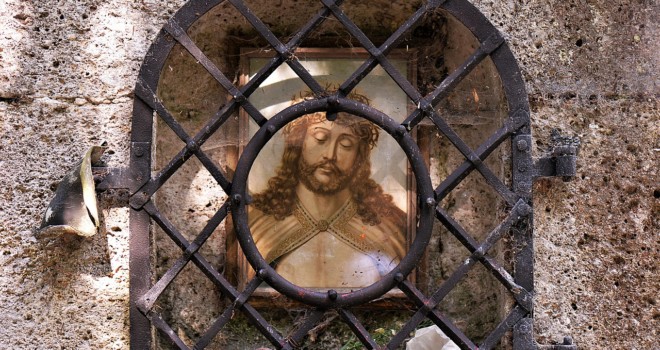The disciples of the Pharisees and Herodians in St. Matthew’s Gospel remind us of how dishonesty can easily enter into our hearts and control our actions and attitudes towards God and others. The Evangelist tells us that they were sent to Jesus after they had “plotted how they might entrap Him in speech.” They clearly were on a deceptive mission. Before asking Jesus if it was right to pay the census tax to Caesar or not, they began by treacherously flattering Him, “Teacher, we know that you are a truthful man…and you are not concerned with anyone’s opinion.” Their praise did not come from sincere hearts at all.
Jesus, seeing through their malice and deception, did not give them a “Yes” or “No” answer in response to their question about paying taxes to Caesar. But He brings in the more important question i.e. the question about first giving God His due, “Then repay to Caesar what belongs to Caesar and to God what belongs to God.” His answer is to teach them that their dishonesty in relating with Him was rooted in their dishonesty in their relationship with God.
We too are dishonest in our relationship with others, not giving them their due or taking from them what is not ours to take, because we are dishonest in our relationship with God first i.e., we are not striving to give Him what is His due. We are trying to deny Him or take from Him what belongs to Him and to Him alone. It is only when we are honest in our relationship with God and constantly striving to give Him what is His due, that we can be honest in our relationship with others.
But is it possible for us to give God what is due to Him? On our own, it is impossible for us to do so because God owns it all, including our very selves. There is nothing that we can give to God that He does not already own and direct by His providence.
The Prophet Isaiah speaks of God anointing the Persian king, Cyrus, and using him to liberate His people from Babylon and rebuild Jerusalem and the temple even though Cyrus did not know God. Hear God’s words to Cyrus through the prophet, “I am the Lord and there is no other, there is no God besides me. It is I who arm you, though you know me not.” What could we possibly give to a God as His due when He has power and control over all creation that He could use a powerful pagan king to set His own people free?
It is only Jesus Christ, the beloved Son of God, who gives to the Father what is due to Him. He is the only one true to the Father and also true to us. When John the Baptist tried to dissuade Him from receiving baptism from him at the Jordan, Jesus had replied, “Let it be so for now; for thus it is fitting for us to fulfill all righteousness.”(Mt 3:15) He does not just fulfill the justice due His Father but He also allows us to do the same through Him. Even His treacherous rivals who ask about paying taxes to Caesar rightly affirmed His honesty and integrity before God and man.
The only way we can hope to repay God with what is His due is to unite ourselves with Jesus Christ. Jesus put it this way, “Remain in me. Apart from me you can do nothing.”(Jn 15:5) We unite ourselves to Him by living an intense life of faith, hope, and love.
St. Paul affirms the Thessalonians for their continuous striving to grow in these theological virtues, “We give thanks to God always for all of you…, unceasingly calling to mind your work of faith, and labor of love and endurance in hope of our Lord Jesus Christ.” These virtues, infused at baptism, unite us with Christ Jesus and allow Him to work in us and through us by the power of His Spirit.
Psalm 12:1-2 accurately captures the state of dishonesty that we find in our world and in the Church today when it says, “Help, O Lord, for good men have vanished; truth has gone from the sons of men. Falsehood they speak one to another, with lying lips, with a false heart.” The lingering financial and sexual scandals in the Church, the wicked cover-up of prelates, the false teaching of many of the clergy, and the abuse and corruption of people in public office testify to this dishonesty in human relationships.
It is so easy for us to point to authority figures, civil and religious leaders and condemn them for their dishonesty in word and action. We are usually right in doing so. But we hardly stop to remind ourselves that these people did not come down directly from heaven. No; they came from a culture that is also similarly dishonest or one that condones dishonesty. The corruption and dishonesty we find in the Church, politics, and government began in the society, more specifically in the family. We too have contributed in one way or another to the climate of dishonesty that we find in the Church and in society.
We only have to ask ourselves if our level of faith, hope and love for God is truly worthy of the living God? Is our faith in God lively enough to obey Him in all His commands and to entrust ourselves completely to Him? How open are we to believe what God reveals to us, act on it, and honestly reveal ourselves to Him? Are we not more prone to deny the painful and challenging truth that alone can save us?
How firm is our hope in Him? Are we really expecting all things from Him or don’t we have our idolatrous substitutes always ready at hand? Are we not still putting our trust in our own abilities and talents? Are we honest enough in bringing all our needs to Him in prayer? Are we living in that trust that He would never abandon us like others do?
Then how ardent is our love for God? How firm is our desire to please Him alone in all that we think, say and do? Is our love for Him deep enough that we can be truthful and honest in all things, even about our most shameful sins and failures? Do we love God enough to dread offending Him through sin? How much of our worship of God is prompted by this love for God and not love for gain?
My dear brothers and sisters in Christ, when we are not growing and maturing in these virtues, there is no way that we can hope to give God what is His due and to do likewise to others. Then we begin to take from God what is rightfully His. We begin to take from Him the right to decide good and evil. We begin to take from Him the right to take human life at will, even if it is the life of the unborn. We refuse to give Him the praise, glory and thanks that is His due. We worship created things and ignore the true and living God. Our failure to give to God and to others their due kills our inner peace and destroys any peace that we could have in society and in the Church.
God remains faithful to us, even when we are not faithful. That is why Jesus never ceases to come to us as He does today and to unite Himself to us in the Eucharist we celebrate. He wants to act in us and through us and to give the Father the glory that is due to Him in all circumstances of our lives. He also wants to move us from within to give to others their due too.
In our times when we tend to place so much emphasis on our relationship with God and ignore giving Him His rightful due, let our faith in Him be truly alive, our hope enduring, and our love ardent. This is the only way we can have that inner peace that only comes from living in honest and truthful relationship with God and with others.
Glory to Jesus!!! Honor to Mary!!!
✠













